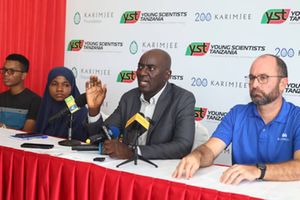Meet Glory, young entrepreneur making money from dairy trade

What you need to know:
- With most of milk going to waste, Ms Mtei saw clear opportunities in the dairy sub-sector that had not been explored and exploited to the full
Dar es Salaam. The market challenges and the loss of fresh milk – especially during the rainy season – have led Glory Mtei to using her university-level knowledge in helping livestock farmers in the Hanang District of the Manyara Administrative Region to functionally add value to their dairy products.
“I had always dreamt of being a businesswoman, as I am from a family with a ‘doing business’ background. However, after I graduated from University in 2014,I was obsessed with salaried employment – and, as such, I did not want to become a farmer and continue to live in the cattle-rich place where I was born and grew up,”she says.
“In any case, I did four formal job interviews, all of which I was told I had flopped! Although I was disappointed by this, I nonetheless heeded my father’s advice, who inspired me to finally venture into a business of my own in my home district, which is awash with business opportunities for the venturous.
“During my school holidays, I used to see ‘bodaboda’(motorcycle taxis) transporting milk from the village for sale in town. But, the local market for milk was fluctuating, being at its lowest in the rainy season, with lots of milk remaining unsold in households.
“If nothing else,” Ms Mtei recalls, “this prompted me to research for a functional solution, including adding value to the production chain.”
A recent report from the Ministry of Livestock and Fisheries says that dairy production in Tanzania has increased by three percent, rising from 3.01 billion litres in 2019/2020 to 3.1 billion litres in 2020/2021. [Census of Agriculture, Livestock and Fisheries, 2020]. About 2.17 billion litres of that total amount came from indigenous cattle.
As it is, Tanzania is home to the second-largest livestock herds on Africa, after Ethiopia.
And, 1.2 million out of the 33.9 million cattle across the land are dairy cows.
According to Ms Glory Mtei, Hanang produces about 380,606 litres of raw milk monthly, out of which about 186,193 litres are from indigenous cattle breeds. But, much of that goes to waste in one form or another during the rainy season, mostly because of poor market accessibility then. And, perhaps as the Sisters of Fate would have it, the rainy season is when there is plenty of livestock grass feeds, resulting in increased milk production!
Ms Mtei told SMEs Digest at The Citizen that this situation presented her with clear opportunities in the dairy sub-sector that had not been explored and exploited to the full – especially in the value-addition chain.
Clearly, functional value-addition would enable livestock farmers to turn their losses in raw milk to profitable, value-added end-products throughout the year, come rain, come shine!
Thanks in part to the Small Industries Development Organization (Sido), Ms Mtei was trained in production, leading to her creating a brand for her products in the name and style of ‘Moow! Life’.
Today, she has made a name for herself and her brand which is sold in the Hanang and Katesh areas of Manyara Region as matter of course.
Ms Mtei also has the Digital Opportunity Trust-Tanzania(DOT Tanzania)to thank for her relatively early success in the milk value-chain business.
It was through the ‘Dare to Change Tanzania Social Entrepreneurship Programme’ under DOT that she received Sh5 million as seed funding with which she start the dairy value-addition business in 2020.
Her goal is to see livestock farmers in Hanang District –especially women – gain by having reliable markets for their milk even during the rainy season.
Born and raised in Hanang in Manyara Region, Ms Glory Mtei graduated with a Bachelor’s degree in Business Administration from the Mwanza Region-based St Augustine University in 2011 – and then graduated with a Master’s degree in Science in Entrepreneurship from the Mzumbe University in Morogoro Region in 2014.
“Through appropriate exposure and education, I believe I am in a good position to positively impact my community in Hanang by being able to identify their problems and creating functional solutions that benefit the community,” she says.
Starting, exposure and capturing the market
“I started this dairy business last year, and my small factory has the capacity to produce 30 to 50 litres of yogurt a month. The product is already in high demand, with customers already trusting my product within a relatively short period of time in the market,” she says.
Currently, she buys raw milk from Bodaboda transporters-cum-sellers at Sh1200 a litre – milk for which they pay Sh800 a litre as farm-gate price.
She then adds value to the milk before selling the final product…
In that regard, Ms Mtei already employs two youths who work to produce milk yogurt.
Demand for the ‘Moow!Life’ yogurt is already high because the people use it for food like Ugali(stiff porridge), which was in the past coming from a dairy in Tanga Region, hundreds of miles away, she says – adding that the locals can now use yogurt virtually from next-door!
Mtei’s vision has been accelerated by Digital Opportunity Trust (DOT) Tanzania, under the Dare to Change Tanzania Social Entrepreneurship program where she received training and seed funding of Sh.5 million to start a value-addition business.
“DOT has been really helpful because I just had an idea but through training, mentorship sessions I was able to bring the idea to an actual business. Also through the Dare to Change 2020 competition I was able to receive seed funds.”
DOT Tanzania is a youth-led movement of daring social innovators who have the tools, knowledge and networks to create opportunities and transform their own communities.
The Non-Profit Organisation supports youth to become innovators and leaders – as well as to create and apply digital solutions that have a positive impact in their communities.
Every year, DOT Tanzania recruits youth with a compelling vision for change for their communities. It then trains them for several weeks; gives them a chance to pitch their ideas for funding; coaches and mentors them for business resilience – and, as a final step: connects them to other organisations that will take the business to the next level.
Through its other programmes, DOT Tanzania trains unemployed graduates on leadership, digital, business and 21st-century skills. It then deploys them back to their community where they mobilize other peers (out-of-school and out-of-work youth) and train them on same.
The youth become digital ambassadors and community leaders who help other youth to get employment, or improve their businesses. So far, it has worked with over 250 youth who then went on to train over 20,000 people across the country.
Challenges and future plans
“The main objective of ‘Moow! Life’ is to provide women with an assured and lucrative market for milk. However, we are faced with the challenge of an underdeveloped milk collection system,” Ms Mtei says.
“In the coming days, we will be working with the Hanang District Council to contract the 24-member Hamasa Women Group as our milk suppliers. But we also plan to have a collection centre of our own that would collect large quantities,” she says. Stressing that “‘Moow! Life’ is a social enterprise,” Ms Glory Mtei says “our aim is not only to sell value-added products, but also to impact the lifestyle of our customers. We, therefore, will be sharing useful information with our customers so that they know they are not only buying quality products, but are also impacting other families in the pastoral community.”
Finally, she called on the government to work on providing better cattle breeds, helping farmers to readily access milking machines to avoid losses, and also increase the number of veterinary services providers so as to educate livestock keepers on how they can take good care of their cattle, thus increasing production in the livestock sector.





